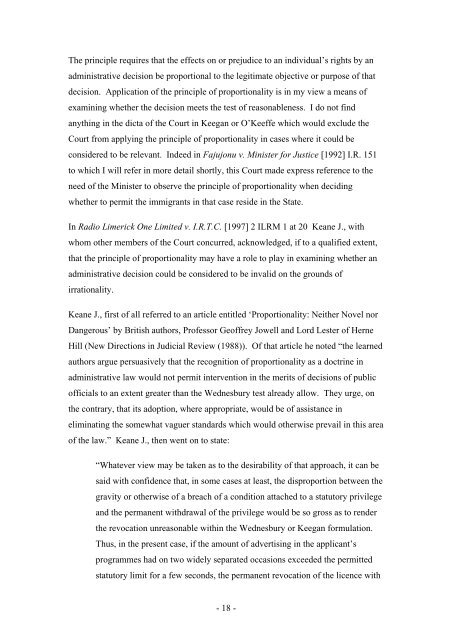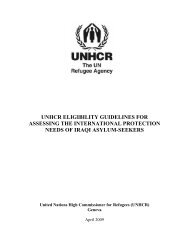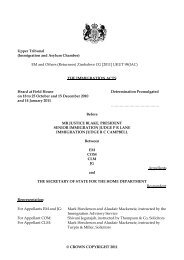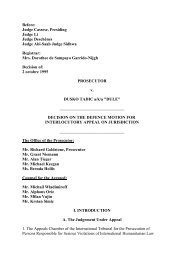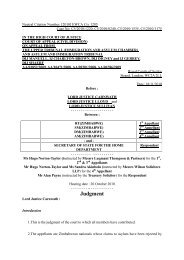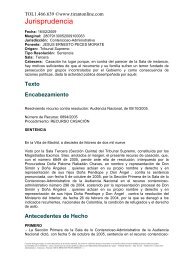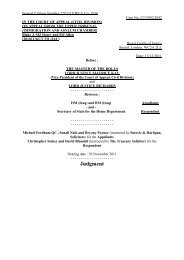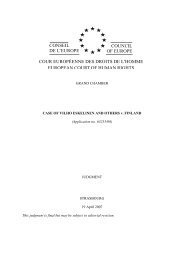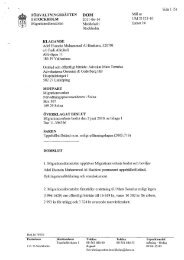Meadows v MJELR IESC 3.pdf - European Database of Asylum Law
Meadows v MJELR IESC 3.pdf - European Database of Asylum Law
Meadows v MJELR IESC 3.pdf - European Database of Asylum Law
You also want an ePaper? Increase the reach of your titles
YUMPU automatically turns print PDFs into web optimized ePapers that Google loves.
The principle requires that the effects on or prejudice to an individual’s rights by anadministrative decision be proportional to the legitimate objective or purpose <strong>of</strong> thatdecision. Application <strong>of</strong> the principle <strong>of</strong> proportionality is in my view a means <strong>of</strong>examining whether the decision meets the test <strong>of</strong> reasonableness. I do not findanything in the dicta <strong>of</strong> the Court in Keegan or O’Keeffe which would exclude theCourt from applying the principle <strong>of</strong> proportionality in cases where it could beconsidered to be relevant. Indeed in Fajujonu v. Minister for Justice [1992] I.R. 151to which I will refer in more detail shortly, this Court made express reference to theneed <strong>of</strong> the Minister to observe the principle <strong>of</strong> proportionality when decidingwhether to permit the immigrants in that case reside in the State.In Radio Limerick One Limited v. I.R.T.C. [1997] 2 ILRM 1 at 20 Keane J., withwhom other members <strong>of</strong> the Court concurred, acknowledged, if to a qualified extent,that the principle <strong>of</strong> proportionality may have a role to play in examining whether anadministrative decision could be considered to be invalid on the grounds <strong>of</strong>irrationality.Keane J., first <strong>of</strong> all referred to an article entitled ‘Proportionality: Neither Novel norDangerous’ by British authors, Pr<strong>of</strong>essor Ge<strong>of</strong>frey Jowell and Lord Lester <strong>of</strong> HerneHill (New Directions in Judicial Review (1988)). Of that article he noted “the learnedauthors argue persuasively that the recognition <strong>of</strong> proportionality as a doctrine inadministrative law would not permit intervention in the merits <strong>of</strong> decisions <strong>of</strong> public<strong>of</strong>ficials to an extent greater than the Wednesbury test already allow. They urge, onthe contrary, that its adoption, where appropriate, would be <strong>of</strong> assistance ineliminating the somewhat vaguer standards which would otherwise prevail in this area<strong>of</strong> the law.” Keane J., then went on to state:“Whatever view may be taken as to the desirability <strong>of</strong> that approach, it can besaid with confidence that, in some cases at least, the disproportion between thegravity or otherwise <strong>of</strong> a breach <strong>of</strong> a condition attached to a statutory privilegeand the permanent withdrawal <strong>of</strong> the privilege would be so gross as to renderthe revocation unreasonable within the Wednesbury or Keegan formulation.Thus, in the present case, if the amount <strong>of</strong> advertising in the applicant’sprogrammes had on two widely separated occasions exceeded the permittedstatutory limit for a few seconds, the permanent revocation <strong>of</strong> the licence with- 18 -


